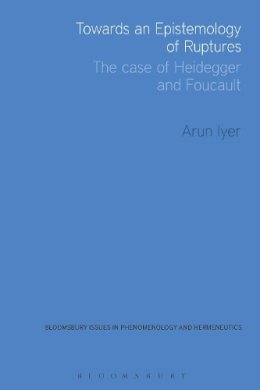
Stock image for illustration purposes only - book cover, edition or condition may vary.
Towards an Epistemology of Ruptures
Arun Iyer
€ 49.75
FREE Delivery in Ireland
Description for Towards an Epistemology of Ruptures
Paperback. Num Pages: 232 pages, black & white illustrations. BIC Classification: HPCF; HPK. Category: (U) Tertiary Education (US: College). Dimension: 236 x 157 x 19. Weight in Grams: 364.
By systematically uncovering and comprehensively examining the epistemological implications of Heidegger's history of being and Foucault's archaeology of discursive formations, Towards an Epistemology of Ruptures shows how Heidegger and Foucault significantly expand the notions of knowledge and thought. This is done by tracing their path-breaking responses to the question: What is the object of thought? The book shows how for both thinkers thought is not just the act by which the object is represented in an idea, and knowledge not just a state of the mind of the individual subject corresponding to the object. Each thinker, in his own way, argues that thought is a productive event in which the subject and the object gain their respective identity and knowledge is the opening up of a space in which the subject and object can encounter each other and in which true and false statements about an object become possible. They thereby lay the ground for a new conceptual framework for rethinking the very relationship between knowledge and its object.
Product Details
Format
Paperback
Publication date
2015
Publisher
Bloomsbury Publishing PLC United Kingdom
Number of pages
232
Condition
New
Number of Pages
232
Place of Publication
London, United Kingdom
ISBN
9781474242004
SKU
V9781474242004
Shipping Time
Usually ships in 4 to 8 working days
Ref
99-1
About Arun Iyer
Arun Iyer teaches Philosophy at Seattle University, USA.
Reviews for Towards an Epistemology of Ruptures
I praise Iyer first and foremost for his clarity of style, which does not come at the expense of intellectual interest or depth. In this book Iyer moves effortlessly between Kant, Heidegger, Husserl, and Foucault in a way that is elucidating and purposeful.
Stephen Mendelsohn, Boston College, USA
Research in Phenomenology
Epistemology as traditionally conceived seeks to determine the nature of knowledge and justification. Its point of departure is Plato's critique of the relativism of Protagoras, who according to Plato erred by accepting Heraclitus' construal of being as becoming. Truth, knowledge, and justification must be grounded in timeless entities of some sort. Arun Iyer shows how Heidegger and Foucault reverse this Platonic argument. For them, truth, knowledge, and justification are irreducibly historical. Iyer's elaboration of their views is subtle, original, and thought-provoking.
Andrew Cutrofello, Professor of Philosophy, Loyola University Chicago, USA
Stephen Mendelsohn, Boston College, USA
Research in Phenomenology
Epistemology as traditionally conceived seeks to determine the nature of knowledge and justification. Its point of departure is Plato's critique of the relativism of Protagoras, who according to Plato erred by accepting Heraclitus' construal of being as becoming. Truth, knowledge, and justification must be grounded in timeless entities of some sort. Arun Iyer shows how Heidegger and Foucault reverse this Platonic argument. For them, truth, knowledge, and justification are irreducibly historical. Iyer's elaboration of their views is subtle, original, and thought-provoking.
Andrew Cutrofello, Professor of Philosophy, Loyola University Chicago, USA
